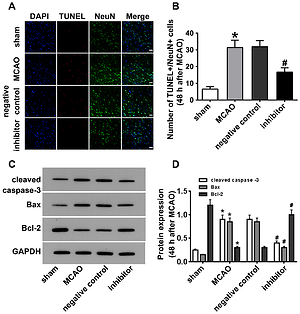Current issue
Archive
Manuscripts accepted
About the Journal
Editorial office
Editorial board
Section Editors
Abstracting and indexing
Subscription
Contact
Ethical standards and procedures
Most read articles
Instructions for authors
Article Processing Charge (APC)
Regulations of paying article processing charge (APC)
HEPATOLOGY / RESEARCH PAPER
Inhibition of miR-34a ameliorates cerebral ischemia/reperfusion injury by targeting brain-derived neurotrophic factor
1
The Second Affiliated Hospital of Hunan University of Chinese Medicine, China
2
Xiangya Hospital, Central South University, China
Submission date: 2021-04-30
Final revision date: 2021-10-11
Acceptance date: 2021-10-24
Online publication date: 2021-10-29
KEYWORDS
TOPICS
ABSTRACT
Introduction:
Oxidative stress and neuronal apoptosis are strongly associated with the pathogenesis of ischemic stroke. In this study, we aimed to determine whether miR-34a was involved in ischemia/reperfusion (I/R) injury, oxidative stress, and neuronal apoptosis by targeting brain-derived neurotrophic factor (BDNF).
Material and methods:
Rats received middle cerebral artery occlusion (MCAO) surgery to simulate I/R injury. At 24 h after MCAO surgery, neurological deficits and infarct volumes were evaluated according to Longa’s scale and 2,3,5-triphenyltetrazolium (TTC) chloride staining. Neuronal apoptosis was assessed by terminal deoxynucleotidyl transferase-mediated dUTP nick-end labeling (TUNEL), and the expression of miR-34a and associated proteins were detected by quantitative reverse-transcription polymerase chain reaction (qRT-PCR), and western blotting. Several markers of oxidative stress were detected using commercial kits, and the interaction between miR-34a and BDNF was measured by RNA immunoprecipitation (RIP).
Results:
The results showed that miR-34a was upregulated (p < 0.05), whereas BDNF was downregulated (p < 0.05) in the MCAO rats, and this negative correlation was accompanied by clear oxidative stress and neuronal apoptosis. RIP demonstrated a clear interaction between miR-34a and BDNF. Furthermore, miR-34a was also found to inhibit oxidative stress and neuronal apoptosis, increase BDNF expression, and ameliorate neurological deficits and infarct volumes (p < 0.05) seen in the MCAO rats.
Conclusions:
These data suggested that inhibition of miR-34a ameliorated cerebral ischemia/reperfusion injury by targeting BDNF. This mechanism represents a novel and promising target for the treatment of strokes.
Oxidative stress and neuronal apoptosis are strongly associated with the pathogenesis of ischemic stroke. In this study, we aimed to determine whether miR-34a was involved in ischemia/reperfusion (I/R) injury, oxidative stress, and neuronal apoptosis by targeting brain-derived neurotrophic factor (BDNF).
Material and methods:
Rats received middle cerebral artery occlusion (MCAO) surgery to simulate I/R injury. At 24 h after MCAO surgery, neurological deficits and infarct volumes were evaluated according to Longa’s scale and 2,3,5-triphenyltetrazolium (TTC) chloride staining. Neuronal apoptosis was assessed by terminal deoxynucleotidyl transferase-mediated dUTP nick-end labeling (TUNEL), and the expression of miR-34a and associated proteins were detected by quantitative reverse-transcription polymerase chain reaction (qRT-PCR), and western blotting. Several markers of oxidative stress were detected using commercial kits, and the interaction between miR-34a and BDNF was measured by RNA immunoprecipitation (RIP).
Results:
The results showed that miR-34a was upregulated (p < 0.05), whereas BDNF was downregulated (p < 0.05) in the MCAO rats, and this negative correlation was accompanied by clear oxidative stress and neuronal apoptosis. RIP demonstrated a clear interaction between miR-34a and BDNF. Furthermore, miR-34a was also found to inhibit oxidative stress and neuronal apoptosis, increase BDNF expression, and ameliorate neurological deficits and infarct volumes (p < 0.05) seen in the MCAO rats.
Conclusions:
These data suggested that inhibition of miR-34a ameliorated cerebral ischemia/reperfusion injury by targeting BDNF. This mechanism represents a novel and promising target for the treatment of strokes.
Share
RELATED ARTICLE
We process personal data collected when visiting the website. The function of obtaining information about users and their behavior is carried out by voluntarily entered information in forms and saving cookies in end devices. Data, including cookies, are used to provide services, improve the user experience and to analyze the traffic in accordance with the Privacy policy. Data are also collected and processed by Google Analytics tool (more).
You can change cookies settings in your browser. Restricted use of cookies in the browser configuration may affect some functionalities of the website.
You can change cookies settings in your browser. Restricted use of cookies in the browser configuration may affect some functionalities of the website.



